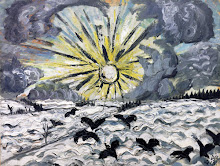It is said that, when he was a young man,
Lincoln once saw slaves in chains
and that the sight shaped his outlook;
whether the story is anecdotal or not
it stands to reason that a man of wisdom
would see things in such a way,
a way in which he placed himself in the place
of others and shuddered at the feeling.
Once I knew a man in chains,
though they were not made of iron,
they bound him as surely as any slave
to the mercy of a limited space
in which slight movement was possible;
and, barring a miracle, they would never break
only grow tighter and the space more limited
until they had strangled life away.
Learning to live with chains cannot be easy,
those gradual limitations ever reaching,
the legs, the arms and the fingers,
the creeping agony of not pain but frustration;
the acknowledgment of loss despite the fight
each motion less until motion is denied
and physical dignity becomes a lost memory
that only wisdom can overcome.
And such wisdom is never easily learned;
forced upon us unwillingly, unwittingly
so many of us would reject it
and accept the bitterness and live in hate;
to live in love and acceptance is the harder choice,
the path stony, the nettles and thistles tearing
pieces of the soul until you would imagine
that the soul was somehow compromised.
This was not the case of the man in chains,
his soul's choice was to flower
amidst the weeds, waste and stone,
to blossom, to smooth, to soften the desolation
and those of us who came upon this
could only stare in wonder
at the difference one man could make;
but we only excused our inactivity.
I recalled Lincoln sickened, seeing the slaves,
and my heart was broken at the thought,
yet I could almost understand a transcendence
which creates such men out of dust, out of toil
that chains do not detract from their essence,
that their chains define us and our weaknesses;
it is to our sorrow that they are called beyond
but a joy that they leave us such gifts.
Subscribe to:
Post Comments (Atom)

No comments:
Post a Comment